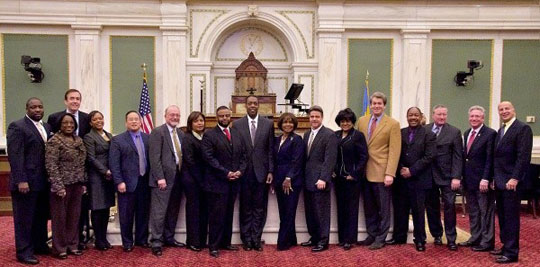 Philadelphia City Council passing the benchmarking regulations. The first rule of energy efficiency is a simple one: To reduce energy consumption, you need to know how much you are using. That’s why this past June, Philadelphia became the sixth city in the country to enact an energy benchmarking law, which requires owners and operators of buildings with 50,000 or more square feet of indoor space to report annual energy expenditures.
Philadelphia City Council passing the benchmarking regulations. The first rule of energy efficiency is a simple one: To reduce energy consumption, you need to know how much you are using. That’s why this past June, Philadelphia became the sixth city in the country to enact an energy benchmarking law, which requires owners and operators of buildings with 50,000 or more square feet of indoor space to report annual energy expenditures.
“There’s really a twofold goal,” says Alex Dews, policy and program manager for the Mayor’s Office of Sustainability. “We get building owners to understand where they are using the bulk of their energy, which provides them with opportunities to become more efficient. It also provides consumer transparency to people who want to support a more sustainable community.”
By understanding how energy is used, businesses can save both energy and money. This is especially important to Philadelphia because, as Dews notes, “Sixty percent of building energy use in [our city] is commercial.” In the long run, according to Dews, this creates further incentive for other businesses and property owners (both large and small) to do the same.
The reporting deadline was November 25, and Dews reports compliance covering 60 percent of facilities and 70 percent of the relevant square footage, which he calls “very good for year one.” Also good news is that the respondents’ mean score of 61.2 out of 100 is 20 percent higher than the national average. As for the respondents who scored much lower, they provide excellent opportunities for the city to meet Mayor Nutter’s target of reducing the city’s energy consumption by 10 percent in 2015. The next reporting deadline is June 2014, and if saving money and energy wasn’t incentive enough, those results will be made public.
Story by Courtney Sexton.







